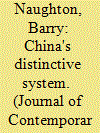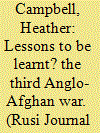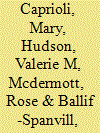|
|
|
Sort Order |
|
|
|
Items / Page
|
|
|
|
|
|
|
| Srl | Item |
| 1 |
ID:
095537


|
|
|
|
|
| Publication |
2010.
|
| Summary/Abstract |
The idea of the 'Beijing Consensus' does not accurately describe what has happened in China, nor does it represent a consensus among Chinese economists and policy-makers. This article presents six distinctive features of China's economic development, and argues that while each provides important lessons, none are easily copied by other developing countries. The intertwining of state and market in China is at the root of China's most distinctive developmental features. However, the specific character of the Chinese system and the way in which government and business relations have been structured cannot be readily replicated in other countries.
|
|
|
|
|
|
|
|
|
|
|
|
|
|
|
|
| 2 |
ID:
141258


|
|
|
|
|
| Summary/Abstract |
Women are ubiquitous and critical to the nutritional well-being of their families, yet they are often invisible to policy-makers, public officials, community leaders, and researchers. Effecting significant decreases in the number of hungry poor people, as well as the improvement of nutritional and economic outcomes, requires policy in addition to operational and research priorities that are directed at the needs of women and girls.
|
|
|
|
|
|
|
|
|
|
|
|
|
|
|
|
| 3 |
ID:
141281


|
|
|
|
|
| Summary/Abstract |
The Israeli-Palestinian conflict is of enormous interest to scholars and policy-makers, yet the internal Israeli policy debate on this issue is often overlooked or oversimplified. It is impossible to understand Israeli actions, the constraints on Israeli decision-makers and the trajectory of the conflict itself without a deeper understanding of this debate. This article presents a framework for categorizing the leading policy prescriptions currently advocated in Israel with respect to the Israeli-Palestinian conflict, drawing on public statements by politicians and leading think-tanks, and surveys of public opinion. The most discussed Israeli policy options are presented as follows: maintain the status quo; proactively move towards two states through either a negotiated agreement (Plan A) or unilateral separation (Plan B); or entrench Israeli presence in the West Bank through settlement expansion and annexation. Various public opinion surveys show the extent to which the Israeli public is divided on the issues, and an analysis of Israel's 2013–14 coalition demonstrates how all these approaches were being promoted simultaneously within the same cabinet, contributing to policy incoherence. The article concludes by outlining how Palestinian and international actions are influencing the Israeli debate, and argues that a move away from the status quo will require decisive Israeli leadership. It also suggests that third party attempts to impose terms for resolving the conflict that do not respond to concerns held widely in Israel are likely to fuel the argument of the status quo camp in the Israeli debate.
|
|
|
|
|
|
|
|
|
|
|
|
|
|
|
|
| 4 |
ID:
137948


|
|
|
|
|
| Summary/Abstract |
At the end of the Third Anglo-Afghan War, the British government in the metropole and the British-led Indian government found themselves at odds in their interpretation of the political situation in Afghanistan, leading them to pursue different policies towards this difficult interlocutor. Heather Campbell analyses the primary sources documenting the difficulties of this decision-making process, and suggests that a sound knowledge of history may be a useful foundation for policy-makers seeking to shape the future of the UK's relationship with Afghanistan.
|
|
|
|
|
|
|
|
|
|
|
|
|
|
|
|
| 5 |
ID:
137946


|
|
|
|
|
| Summary/Abstract |
At the root of the West's conventional military dominance lie investment in and the operationalisation of advances in science and technology (S&T). However, with the funding behind this long-held military edge now being scaled back as part of a wider austerity drive, it is ever-more important that governments invest their money wisely and that new technology is operationalised as effectively as possible. John Louth and Justin Bronk draw on interviews with policy-makers, industry figures and military personnel as well as novel-technology case studies to argue for the ‘operationalisation’ of uncertainty in the early design stages of capability planning, thereby allowing for the inclusion of mature technology at a much later date.
|
|
|
|
|
|
|
|
|
|
|
|
|
|
|
|
| 6 |
ID:
123983


|
|
|
|
|
| Publication |
2013.
|
| Summary/Abstract |
Though widely used by academics and policy-makers in the context of the 'war on terror', the concept of radicalization lacks clarity. This article shows that while radicalization is not a myth, its meaning is ambiguous and the major controversies and debates that have sprung from it are linked to the same inherent ambiguity.
The principal conceptual fault-line is between notions of radicalization that emphasize extremist beliefs ('cognitive radicalization') and those that focus on extremist behavior ('behavioural radicalization'). This ambiguity explains the differences between definitions of radicalization; it has driven the scholarly debate, which has revolved around the relationship between cognition and behavior; and it provides the backdrop for strikingly different policy approaches - loosely labeled 'European' and 'Anglo-Saxon' - which the article delineates and discusses in depth.
Rather than denying its validity, the article calls on scholars and policy-makers to work harder to understand and embrace a concept which, though ambiguous, is likely to dominate research and policy agendas for years to come.
|
|
|
|
|
|
|
|
|
|
|
|
|
|
|
|
| 7 |
ID:
093093


|
|
|
|
|
| Publication |
2009.
|
| Summary/Abstract |
This article describes the WomanStats Project Database - a multidisciplinary creation of a central repository for cross-national data and information on women available for use by academics, policy-makers, journalists, and all others. WomanStats is freely accessible online, thus facilitating worldwide scholarship on issues with gendered aspects. WomanStats contains over 260 variables for 174 countries and their attendant subnational divisions (where such information is available) and currently contains over 68,000 individual data points. WomanStats provides nuanced data on the situation and status of women internationally and in so doing facilitates the current trend to disaggregate analyses. This article introduces the dataset, which is now publicly available, describes its creation, discusses its utility, and uses measures of association and mapping to draw attention to theoretically interesting patterns concerning the various dimensions of women's inequality that are worthy of further exploration. Two of nine variables clusters are introduced - women's physical security and son preference/sex ratio. The authors confirm the multidimensionality of women's status and show that the impact of democracy and state wealth vary based on the type of violence against women. Overall, the authors find a high level of violence against women worldwide.
|
|
|
|
|
|
|
|
|
|
|
|
|
|
|
|
|
|
|
|
|